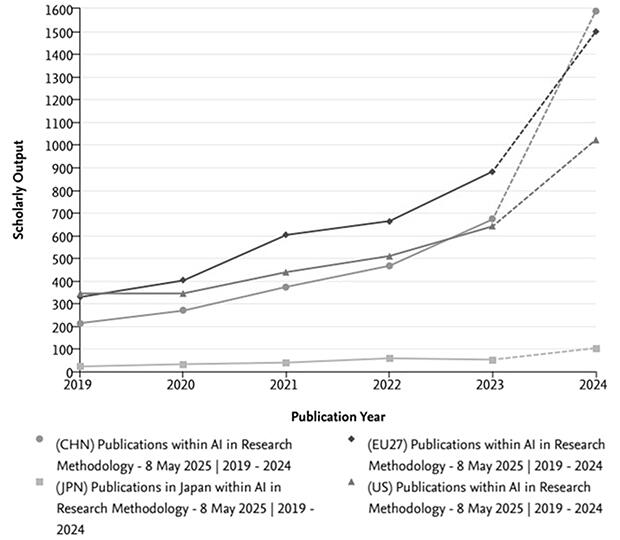Although the number of research papers utilizing AI in Japan is one-seventh to one-tenth of those of Europe, the United States, and China, Japan's research impact (Field Weighted Citation Impact: FWCI) is at the same level as China. Therefore, it is entirely possible for Japan to enhance its global presence by promoting AI utilization across various research fields in the future. The Science News and Elsevier conducted a joint investigation into the status of AI utilization in research across different fields and Japan's current situation.

Provided by the Science News, Elsevier
This study created a field called "AI in Research" and conducted analysis targeting papers registered in Elsevier's Scopus, one of the world's largest abstract and citation databases. The number of papers utilizing AI published worldwide in the five years from 2019 to 2023 was 18,936 papers (42.9% being open access papers), of which 4,985 papers were from international collaborative research. The average number of citations per paper was 12.1, and the FWCI was 1.64, which is relatively high compared to other fields.
The number of papers utilizing AI has more than doubled over these five years. The EU (27 countries) and the United States were at equivalent levels with the number of papers in the 300s in 2019, but by 2023, the EU had increased to nearly 900 papers while the United States remained in the 600s. China, which had approximately 200 papers in 2019, rapidly expanded to nearly 700 papers by 2023. Meanwhile, Japan's paper count more than doubled from 2019 to 2023, but has not reached 100 papers annually.
According to Elsevier's analysis as of May, while the EU continues to steadily increase its paper count, China's paper growth in the materials science and computer science fields is overwhelming, expected to surpass the EU by 2024. The United States may experience slightly stagnant growth going forward. Meanwhile, Japan is increasing its paper count in materials science, but in the chemistry field where Japan is dominant, the EU is achieving the greatest growth in paper numbers.
The distribution of global AI-utilizing papers by field is as follows: Computer Science (54.1%), Engineering (39.8%), Mathematics (17.7%), Medicine (11.7%), Physics (10.3%), Energy (8%), Materials Science (7.2%), and others. This trend remains largely unchanged when viewed by country.
Examining the research impact (FWCI) and policy impact (what percentage of all papers are cited in policy) of Japan, the United States, the EU, and China, while Japan's paper count is overwhelmingly small, its FWCI is at the same level as China. Specifically, the five-year paper counts and FWCI are: China with 3,508 papers (FWCI 1.58), the United States with 3,244 papers (FWCI 2.05), the EU with 4,343 papers (FWCI 1.85), and Japan with only 302 papers but an FWCI of 1.58, the same as China.
The researchers leading Japan's AI-utilizing research and their papers have also been identified. Director Masashi Sugiyama of RIKEN Center for Advanced Intelligence Project (AIP) and Professor at the Graduate School of Frontier Sciences, the University of Tokyo, has published high-impact papers in statistical machine learning, data mining, and signal image processing, with approximately 30,000 citations. Professor Koji Tsuda at the Division of Biosciences, Graduate School of Frontier Sciences, the University of Tokyo, has approximately 20,000 citations in medical information and life sciences, biosystem science, and bioinformatics. Project Professor Satoru Miyano at the M&D Data Science Center, Institute of Science Tokyo, has approximately 15,000 citations in systems biology, bioinformatics, and AI analysis of biological data. Professor Ryo Yoshida at the Department of Materials Engineering, Graduate School of Engineering, The University of Tokyo, has approximately 8,000 citations in functional polymer gels, smart soft materials, intelligent materials, biomimetics, and biomaterials.
Government and academia should unite to share use cases
The movement to utilize AI in research has been rapidly expanding over the past 1-2 years. While there is a time lag in understanding this due to our reliance on paper databases, it is also a fact that Japan has fallen behind in the global trend. With the enactment of the AI bill, the Japanese government is accelerating AI utilization and research and development. However, to make this effective, the government and academia need to work together on initiatives such as sharing AI use cases in various fields and creating environments that facilitate AI utilization.
This article has been translated by JST with permission from The Science News Ltd. (https://sci-news.co.jp/). Unauthorized reproduction of the article and photographs is prohibited.




